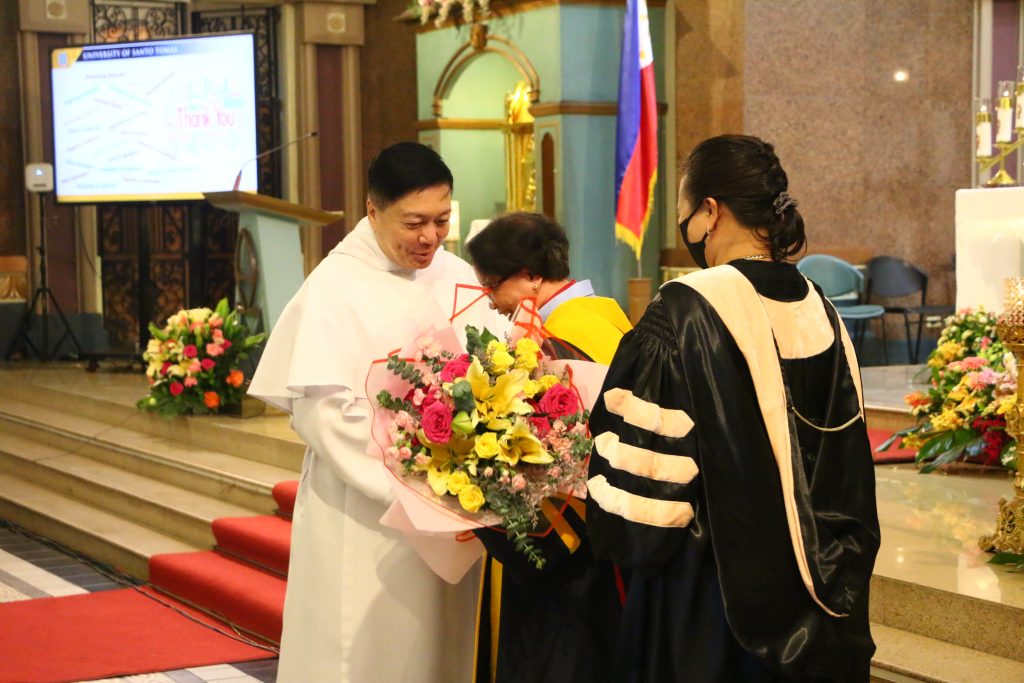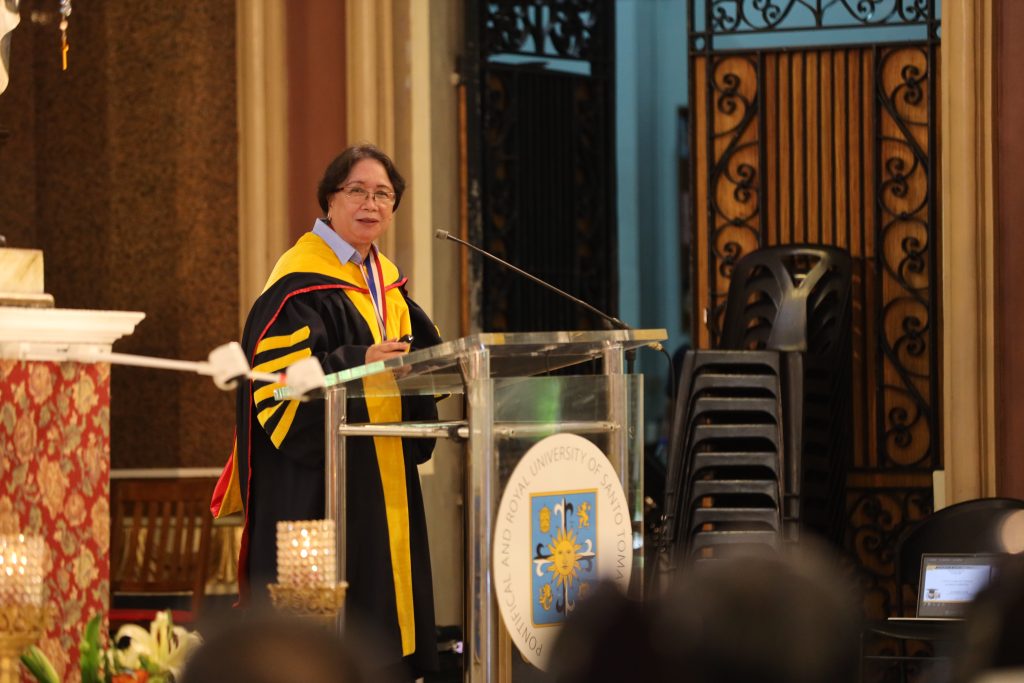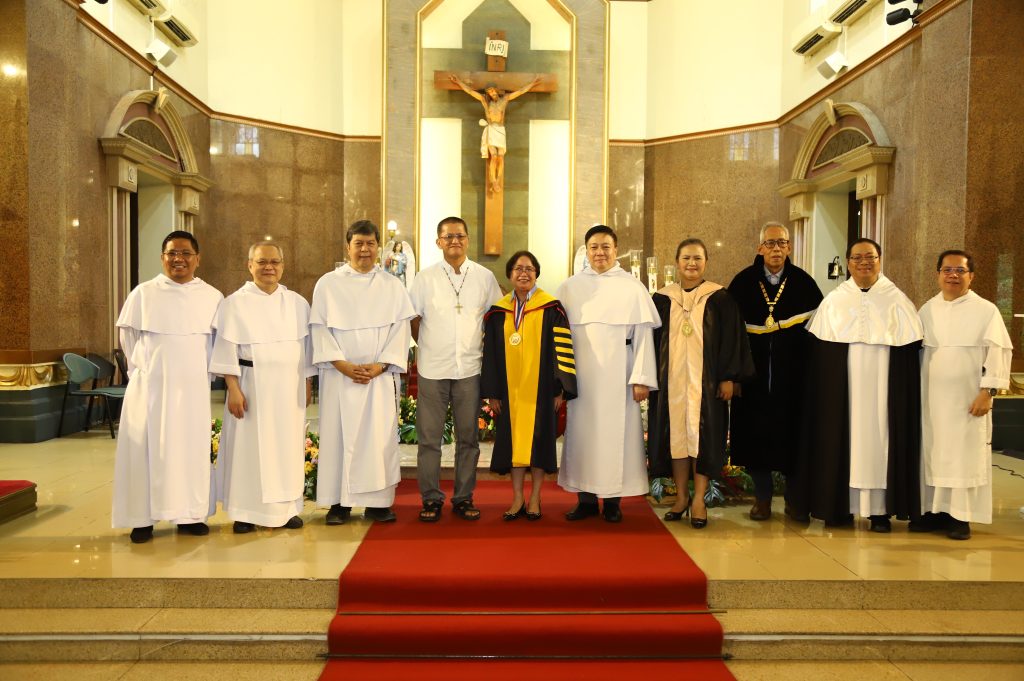Academician Prof. Maribel G. Nonato, Ph.D., the Assistant to the Rector for UST General Santos, unveiled details about the soon-to-be-inaugurated satellite campus in her Discurso de Apertura (Inaugural Lecture) delivered on August 4, 2023.



The Discurso de Apertura immediately followed the Mass of the Holy Spirit that was celebrated to open the Academic Year 2023 to 2024. UST Secretary-General Rev. Fr. Louie R. Coronel, O.P., E.H.L., who served as the Master of Ceremonies, explained that the tradition of an inaugural academic lecture has been essential in the opening exercises of universities across Europe. UST adapted this practice to conform with the tradition of the Dominican houses of studies of starting every school year with a conference called Lectio Prima, or first lecture, based on the UST statutes drafted by Fr. Juan Amador, O.P., in 1785.
Fr. Coronel further added that this year’s lecture joins the longest serial publication of the university: the collection of inaugural addresses delivered at the beginning of every academic year, which includes addresses since 1866.
Dr. Nonato’s lecture, titled “C.A.R.E. in the 21st Century Academic Institution”, focused on a range of caring expressions applicable in the current educational landscape. Using many configurations of acronyms for the letters C, A, R, and E throughout her talk, she tackled factors necessary in the improvement and “Conceptualization of an Academic Institution that is Relevant and Engaging”.
She highlighted the need for “Cutting-edge, Assertive, Resourceful, and Enterprising” management leaders who can consider a lot of factors building an academic institution of higher learning and the focus on “Creation and Advancement of Resources in Education” particularly to face 21st century challenges to higher education.
These challenges stem from external and internal factors, which include globalization, internationalization, industry 4.0, quality assurance, accreditation and rankings, United Nations’ Sustainable Development Goals (UN SDGs), global competitiveness index, Philippine Development Plan, DOST Pagtanaw 2050, Filipinovation, climate change, and new diseases.
Succeeding in or meeting the aforementioned challenges all require different approaches of C.A.R.E., such as “Commitment to Accreditation and Regulatory Entities” to ensure quality education, which is SDG #4. Dr. Nonato said, “Academic institutions can no longer be just observers. Instead, we have to be part of transforming the world and we need to be active participants to play our role in delivering quality education.”
A model academic institution that could be resilient to external and internal factors is a “Comprehensive, Academic Research-oriented Enterprise”, explained Dr. Nonato, who added that “We are living in a world where problems are more complex, and it requires multi-, inter-, trans-, and intra-disciplinary solutions for knowledge production is no longer a single discipline. Knowledge generation and dissemination are no longer carried out in isolation in academic environments. It now involves interaction with other knowledge producers, so the academic institution should be comprehensive.”
Research, as one of the three functions of an institution of higher learning, intensifies competitiveness, internationalization, and globalization, while enterprise education enhances the entrepreneurial minds of the students, simultaneously enriches employment, lifelong learning skills, and adaptability for life beyond school, Dr. Nonato emphasized.
Pointing out that the success of a university lies primarily in its workforce, Dr. Nonato underlined the core need for “Competent with Advanced-degree and Research-oriented Educators” and more partnerships between the academe, industry, and government that can bring more people with expertise to the fold. Aside from its academic staff of educators, HEIs must also invest in “Committed, Able, Resourceful, and Efficient” non-academic personnel. With these in mind, a university can operate better with “Confident, Action-oriented, Reliable, and Ethical” human capital.
Citing the World Economic Forum’s five-year projection for emerging and declining jobs from 2023 to 2027, Dr. Nonato noted that large scale job growth that is expected in education, agriculture, digital commerce and trade is driven by technology, digitalization, and sustainability. Meanwhile, self-efficacy, cognitive, management, engagement, technology, and collaborative skills are crucial for the 2023 workforce.
The importance of “Creative, Adequate, Relevant, and Effective” curricula was also highlighted. This could stem from building stronger linkages with industry partners or the business sector to develop cross-disciplinary academic programs that can more closely meet the requirements of companies and address the issue of skills mismatch.
Included in the discussion was the ongoing development of UST General Santos, which recently topped off its own Main Building and will soon be blessed and inaugurated.
Dr. Nonato, who has been with UST since starting her college days in the 1970s, underscored that the University’s expansion to General Santos and Sta. Rosa shows that UST was just waiting for the right time to “spread its wings beyond España” and “bring Thomasian education to the South.”
UST GenSan will be an integrated innovative agri-tech campus founded in the Thomasian identity, the three core values of competence, commitment, and compassion, and 21st-century digital skills, she said.
“Initial academic programs will be in technology, natural and health sciences, business, social sciences, and humanities,” revealed Dr. Nonato.
Referencing Pope Francis’ call to build an ‘educational village’ in his message for the launch of the 2020 Global Compact on Education, Dr. Nonato shared, “I’d like to envision [UST GenSan] to be an educational village where all the players work harmoniously with the community, industry, Church, and local government.”
The Assistant to the Rector for UST GenSan also expressed her gratitude to the members of the Thomasian community who lent support, saying “The blueprint of the UST General Santos will not be completed without the CARE of several academic and non-academic staff who generously shared their talents and ideas in completing it.”
A retired professor of chemistry, Dr. Nonato is an Academician of the National Academy of Science and Technology and is currently the National Research Council of the Philippines (NRCP) Vice President and Chemical Sciences Division Chair. She is also a member of the Commission on Higher Education – Technical Committee in Chemistry.
She has served UST in different capacities, as the first female lay person to become Vice Rector for Research and Innovation, as the Dean of the College of Science where she used to teach Organic Chemistry, and Director of Research Center for Natural Sciences, among many others.
She pioneered research on phytochemistry and biological activities of Philippine-grown species of the genus Pandanus, with more than 50 publications in internationally indexed journals. Her association with the plant is so widespread that an advisee of hers in the Graduate School, Dr. Christina Tan, named a newly discovered Pandan species after her: Freycinetia nonatoi, a fitting tribute for a leading scholar fondly called the “Pandan Queen” by her colleagues and students.
Her discovery of novel and structurally unique pharmacologically important alkaloids from the genus Pandanus earned her the NRCP’s 2006 achievement award in chemical sciences, the Philippine Association for the Advancement of Science and Technology’s 2016 Gregorio Y. Zara Award for Basic Research, the Philippine Federation of Chemistry Sciences’ 2017 Shimadzu Achievement for Chemical Research, and the Philippine Regulation Commission’s 2020 Outstanding Professional of the Year in Chemistry, among many accolades in her impactful career.
In recognition of her many significant contributions to education and research, Dr. Nonato will be conferred the title of Professor Emeritus on October 13, 2023.




